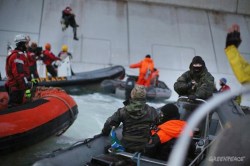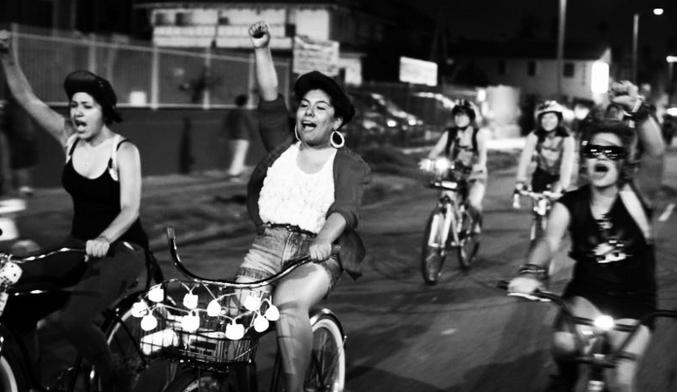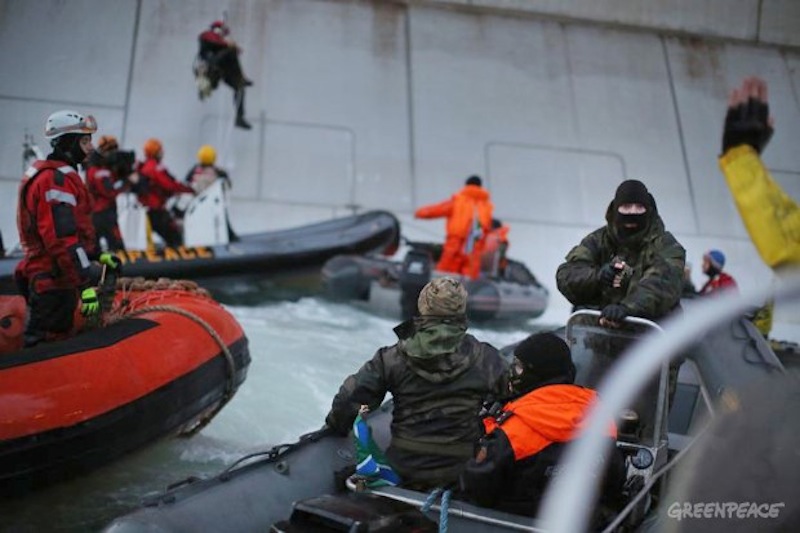
Denis Sinyakov / GreenpeaceRussian Coast Guard officers responded to Greenpeace with water cannons, guns, and a mass arrest.
Greenpeace activists last week scaled the Prirazlomnaya platform, the first of many offshore Arctic oil platform planned in Russian waters. The protesters, perched high above the frigid waters, were forced down with water cannons. Armed officers boarded Greenpeace’s icebreaker, and arrested all 30 activists.
The demonstration was designed to bring international attention to Russia’s burgeoning plans to allow Big Oil to drill in its offshore waters (onshore drilling is already widespread). ExxonMobil and Statoil are among the companies planning to take part in the precarious deepwater plunder.
Obviously, the 30 activists are not pirates. Pirates are seafaring robbers. Yet that’s what some Russian law enforcement authorities are claiming, and that’s how the Greenpeace arrestees may be charged.
“Yarr, maties, we’ve come to loot your oil drill! Wait, whar’s the treasure?”
The environmentalists could be sentenced to as much as 15 years in prison and fined $15,000 apiece if found guilty of trumped-up piracy charges. From Reuters:
Environmental activists who protested at an offshore oil platform in the Russian Arctic last week will be prosecuted, possibly for piracy which is punishable by up to 15 years’ jail, Russian investigators said on Tuesday.
They said the “attack,” in which Greenpeace activists tried scaling the Gazprom-owned Prirazlomnaya platform, Russia’s first offshore Arctic oil platform, had violated Russian sovereignty.
“When a foreign ship full of electronic equipment intended for unknown purposes and a group of people, declaring themselves to be environmental activists, try to storm a drilling platform there are legitimate doubts about their intentions,” the investigators said in a statement.
Even President Vladimir Putin spoke out against the ludicrous notion that these people are pirates. “It is absolutely evident that they are, of course, not pirates, but formally they were trying to seize this platform,” Putin said at an Arctic forum, according to a separate Reuters report. “It is evident that those people violated international law.”
And while we’re discussing harebrained Russian claims, one official said Greenpeace had endangered the area’s wildlife and its ecology, which “is being protected zealously” by Russia. Right.
Greenpeace, meanwhile, decried the authorities’ treatment of the protesters. From the BBC:
The environmental organisation said its protest against “dangerous Arctic oil drilling” was peaceful and in line with its “strong principles.”
“Our activists did nothing to warrant the reaction we’ve seen from the Russian authorities,” it said.
The multinational makeup of the protesters is helping deliver a storm of worldwide press coverage. The protesters are from 18 countries, including the U.S., U.K., Canada, Australia, and Russia. Consular officials have interviewed some of those who were arrested.
Putin’s Russia is not the best place to be jailed for protest. While the Greenpeace drama unfolded, Nadezhda Tolokonnikova, one of the Pussy Riot members who was sentenced to two years in Russian jail for singing a song that asked the Virgin Mary to throw Putin out of power, has been moved to solitary confinement as punishment for a hunger strike. Tolokonnikova was protesting “slave labor” and the treatment of “women like cattle” in jail.
We’ll see whether pseudo-piracy provokes similarly disproportionate treatment.




